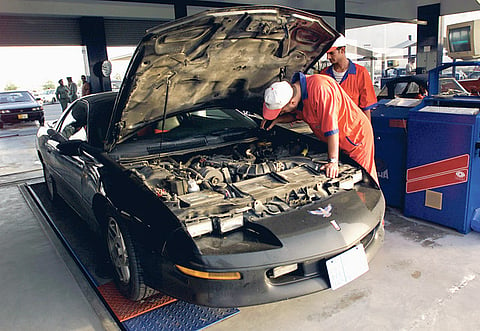How often do you service your car?
Auto experts discuss pros and cons of government’s decision to standardise frequency to 10,000km

Dubai: Climatic conditions are the key to deciding the frequency of service for a vehicle and the extreme temperatures in the UAE should be taken into consideration before deciding how often a car needs an engine service, an auto expert told Gulf News.
The Ministry of Economy on Sunday announced that all cars must be serviced at every 10,000km instead of 5,000km, the frequency commonly recommended by most car manufacturers.
According to the new ruling, manufacturers and authorised car dealers have until the end of this year to comply with the decision.
The decision was apparently taken to uphold consumer interest. However, Gordon Ferguson, general manager at AAA Service Centre, doesn’t seem impressed.
“The decision has certainly been taken to protect the consumers’ interest, which is good, but that shouldn’t be the only factor governing the frequency of car service," said Ferguson.
Main factors
"Climatic conditions are the main factor in maintenance, particularly in high ambient temperatures of around 60 degrees in summer, you have moisture in the air, sand in the air and dust from lots of construction, so all of these play a part in deciding your service intervals,” added Ferguson, who has three decades of experience in the auto industry.
According to Ferguson, service frequency for the same car model varies in different regions, suggesting that a Toyota Camry in European or American weather may not require a service every 5,000km.
He conceded that service can be done at different frequencies depending on the quality of the service at regular intervals -- as well as the product quality being used.
“There are two types of service, minor and major. Depending on which service is being done, there are a number of checks done on the engine components and other parts that undergo wear and tear, more so in this heat. So it is not only the oil and filter that is changed during the service,” he added.
However, oil is the major component of any engine service and the quality and type of oil may vary depending on the service period.
Oil lubricates the internal components of the engine and does so under pressure which is produced via an oil pump which pumps oil all around the engine, top, bottom and back and front.
“There are three main types of oil, mineral-based, which is your basic [type] and is used for regular 5,000km service, and you have semi-synthetic and fully synthetic oil. The last two are longer lasting and are mostly used for high-performance cars like turbo or supercharged or luxury cars,” he said.
Proper maintenance
He added: “Personally, I would go with 5,000km intervals in this country but I would also say some cars should be at 10,000km if the air filtration systems are good and the maintenance is done properly and not by a fuel station or a half-qualified guy.”
According to Ferguson, apart from the climatic conditions and quality of oil, there are two other factors which he believes are very important.
“We have very good road systems here, very good quality roads, long stretches of highway and very low standard of driving, which affects vehicle reliability and lifespan which, in turn, play a part in [a car’s] service requirements,” he stated.
Contrary to Ferguson’s views, Professor Robert Whalley, Head of Programme, MSc Systems Engineering at the British University in Dubai, believes the decision by the Ministry of Economy will prevent motorists from being needlessly exploitated by dealers.
“A mileage service simply requires changing oil and filter and other minor engine components that may need replacing owing to wear and tear. But, generally, if the service is delayed by a few thousand kilometres, it many not hurt the engine. However, most dealers in the UAE link regular service with the validity of vehicles, forcing customers to service their vehicles frequently,” said Prof Whalley.
He added that many car manufacturers already follow the 10,000km frequency and it shouldn’t be a problem for others to follow as well.
“With advanced technology and improvement in quality of oil and the availability of synthetic [oil], it is possible for vehicles to run longer with less frequent engine service,” he added.
Most American automakers recommend engine service at a 10,000km interval, while European and German manufacturers prefer frequencies of 15,000 to 20,000km.
A 5,000km frequency is recommended mostly by Asian automakers, including Toyota, Nissan, and Hyundai.
Spokespersons from Toyota and Nissan in Dubai were not immediately available for comment.



